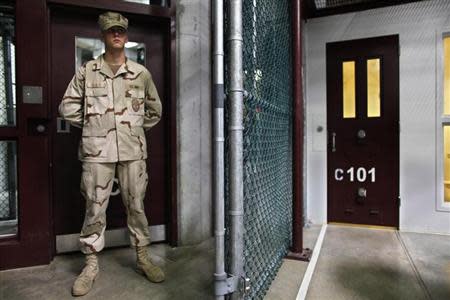Senate military policy debate focuses on Guantanamo, sexual assault

By David Alexander WASHINGTON (Reuters) - U.S. lawmakers clashed on Tuesday over how to deal with sexual assault in the armed forces and what to do about terrorism suspects at the Guantanamo Bay military prison in the opening of Senate debate on the annual defense policy bill. Senators rejected an amendment that could have helped close the Guantanamo prison over time by making it easier to transfer inmates to the United States for trial or imprisonment. They also rejected a competing measure that could have complicated administration efforts to close the facility. Lawmakers set the stage for an emotional discussion of sexual assault in the military on Wednesday, with Senate leaders agreeing to six hours of debate on the issue. More than a dozen senators spoke out about the problem on Tuesday. Democratic Senator Kirsten Gillibrand of New York rallied support for her amendment to place decisions about whether to prosecute sex crimes in the hands professional military prosecutors and remove it from the victim's commanders. She held a Capitol Hill news conference with generals, victims and other senators to urge fellow lawmakers to back her amendment. The measure is opposed by senior Pentagon officials and top military brass, who insist the problem of sexual assault will not be solved unless commanders are held accountable. Retired Brigadier General Loree Sutton, a former Army doctor, told the news conference bold steps were needed to address the problem because too many military commands were marked by fear, humiliation and hazing, "upstream behaviors that set the conditions for horrific crimes such as rape." "Rape is not about sex ... it is a crime that for the most part is committed by heterosexual men whose unbridled need for dominance, control, destruction and aggression utterly violates and shatters the minds, bodies, spirits, hopes and dreams of all who they target," she said. Senate Majority Leader Harry Reid of Nevada endorsed Gillibrand's amendment on Tuesday, dealing a setback to Senator Claire McCaskill, a Missouri Democrat, and Carl Levin of Michigan, the Democratic head of the Senate Armed Services Committee. The two have supported reforms that stopped short of removing sexual assault from the military chain of command. McCaskill told the Senate on Wednesday she had been "frustrated" in recent weeks that the policy difference with Gillibrand had dominated discussion of the sexual assault issue and had obscured the reforms included in the authorization bill. The measure prohibits military service by people convicted of rape and other sex crimes, calls for temporary reassignment of members accused of sexual assault, and takes many other steps to improve the military's response to victims of the crime. "I think we have fashioned historic and amazing changes that are going to forever change the successful prosecution of rapists in our military and go further to protect victims," said McCaskill, a former attorney who has prosecuted sex crimes. Debate on the two Guantanamo amendments highlighted the ongoing split among lawmakers over how best to deal with the 164 terrorism suspects being held at the prison at an estimated cost of $454 million annually, or about $2.75 million per person. "The 164 that are remaining are the meanest, nastiest terrorists in the world, frankly," said Republican Senator Saxby Chambliss of Georgia. "They're the ones nobody's going to want. So if nobody else wants them, why should we allow them to come to the United States?" The remaining prisoners at Guantanamo include al Qaeda members like Khalid Sheikh Mohammed, the suspected mastermind of the September 11 attacks on the United States, and others awaiting possible charges and trial. But 84 of these inmates have been approved for conditional transfer, meaning they can be sent to a country not barred by U.S. law that is willing to provide the security and humane treatment assurances sought by the United States. Democratic Senator Dianne Feinstein noted the cost of holding a detainee at Guantanamo was 35 times that of keeping an inmate at a maximum security prison in Colorado where a number of al Qaeda members are being held after their conviction. In an era of tight budgets, she said, "how can we justify spending approximately $2.8 million per Guantanamo detainee?" (Reporting by David Alexander; editing by Jackie Frank)
